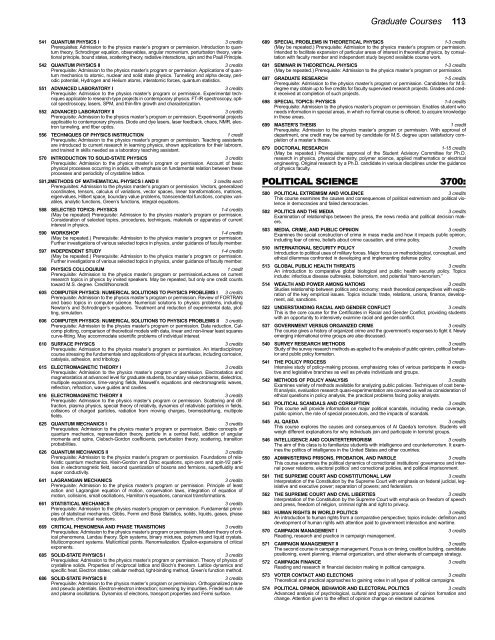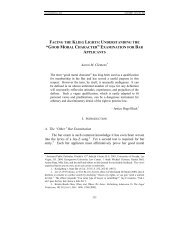2013-2014 GRADUATE BULLETIN - The University of Akron
2013-2014 GRADUATE BULLETIN - The University of Akron
2013-2014 GRADUATE BULLETIN - The University of Akron
Create successful ePaper yourself
Turn your PDF publications into a flip-book with our unique Google optimized e-Paper software.
Graduate Courses 113<br />
541 QUANTUM PHYSICS I 3 credits<br />
Prerequisites: Admission to the physics master’s program or permission. Introduction to quantum<br />
theory, Schrodinger equation, observables, angular momentum, perturbation theory, variational<br />
principle, bound states, scattering theory, radiative interactions, spin and the Pauli Principle.<br />
542 QUANTUM PHYSICS II 3 credits<br />
Prerequisite: Admission to the physics master’s program or permission. Applications <strong>of</strong> quantum<br />
mechanics to atomic, nuclear and solid state physics. Tunneling and alpha decay, periodic<br />
potential, Hydrogen and Helium atoms, interatomic forces, quantum statistics.<br />
551 ADVANCED LABORATORY I 3 credits<br />
Prerequisite: Admission to the physics master’s program or permission. Experimental techniques<br />
applicable to research-type projects in contemporary physics. FT-IR spectroscopy, optical<br />
spectroscopy, lasers, SPM, and thin-film growth and characterization.<br />
552 ADVANCED LABORATORY II 3 credits<br />
Prerequisite: Admission to the physics master’s program or permission. Experimental projects<br />
applicable to contemporary physics. Diode and dye lasers, laser feedback, chaos, NMR, electron<br />
tunneling, and fiber optics.<br />
556 TECHNIQUES OF PHYSICS INSTRUCTION 1 credit<br />
Prerequisite: Admission to the physics master’s program or permission. Teaching assistants<br />
are introduced to current research in learning physics, shown applications for their labroom,<br />
and trained in skills needed as a laboratory teaching assistant.<br />
570 INTRODUCTION TO SOLID-STATE PHYSICS 3 credits<br />
Prerequisite: Admission to the physics master’s program or permission. Account <strong>of</strong> basic<br />
physical processes occurring in solids, with emphasis on fundamental relation between these<br />
processes and periodicity <strong>of</strong> crystalline lattice.<br />
581,2METHODS OF MATHEMATICAL PHYSICS I AND II<br />
3 credits each<br />
Prerequisites: Admission to the physics master’s program or permission. Vectors, generalized<br />
coordinates, tensors, calculus <strong>of</strong> variations, vector spaces, linear transformations, matrices,<br />
eigenvalues, Hilbert space, boundary value problems, transcendental functions, complex variables,<br />
analytic functions, Green’s functions, integral equations.<br />
588 SELECTED TOPICS: PHYSICS 1-4 credits<br />
(May be repeated) Prerequisite: Admission to the physics master’s program or permission.<br />
Consideration <strong>of</strong> selected topics, procedures, techniques, materials or apparatus <strong>of</strong> current<br />
interest in physics.<br />
590 WORKSHOP 1-4 credits<br />
(May be repeated.) Prerequisite: Admission to the physics master’s program or permission.<br />
Further investigations <strong>of</strong> various selected topics in physics, under guidance <strong>of</strong> faculty member.<br />
597 INDEPENDENT STUDY 1-4 credits<br />
(May be repeated.) Prerequisite: Admission to the physics master’s program or permission.<br />
Further investigations <strong>of</strong> various selected topics in physics, under guidance <strong>of</strong> faculty member.<br />
598 PHYSICS COLLOQUIUM 1 credit<br />
Prerequisite: Admission to the physics master’s program or permissionLectures on current<br />
research topics in physics by invited speakers. May be repeated, but only one credit counts<br />
toward M.S. degree. Credit/Noncredit.<br />
605 COMPUTER PHYSICS: NUMERICAL SOLUTIONS TO PHYSICS PROBLEMS I 3 credits<br />
Prerequisite: Admission to the physics master’s program or permission. Review <strong>of</strong> FORTRAN<br />
and basic topics in computer science. Numerical solutions to physics problems, including<br />
Newton’s and Schrodinger’s equations. Treatment and reduction <strong>of</strong> experimental data, plotting,<br />
simulation.<br />
606 COMPUTER PHYSICS: NUMERICAL SOLUTIONS TO PHYSICS PROBLEMS II 3 credits<br />
Prerequisite: Admission to the physics master’s program or permission. Data reduction, Calcomp<br />
plotting, comparison <strong>of</strong> theoretical models with data, linear and non-linear least squares<br />
curve-fitting. May accommodate scientific problems <strong>of</strong> individual interest.<br />
610 SURFACE PHYSICS 3 credits<br />
Prerequisite: Admission to the physics master’s program or permission. An interdisciplinary<br />
course stressing the fundamentals and applications <strong>of</strong> physics at surfaces, including corrosion,<br />
catalysis, adhesion, and tribology.<br />
615 ELECTROMAGNETIC THEORY I 3 credits<br />
Prerequisite: Admission to the physics master’s program or permission. Electrostatics and<br />
magnetostatics at advanced level for graduate students, boundary value problems, dielectrics,<br />
multipole expansions, time-varying fields, Maxwell’s equations and electromagnetic waves,<br />
reflection, refraction, wave guides and cavities.<br />
616 ELECTROMAGNETIC THEORY II 3 credits<br />
Prerequisite: Admission to the physics master’s program or permission. Scattering and diffraction,<br />
plasma physics, special theory <strong>of</strong> relativity, dynamics <strong>of</strong> relativistic particles in fields,<br />
collisions <strong>of</strong> charged particles, radiation from moving charges, bremsstrahlung, multipole<br />
fields.<br />
625 QUANTUM MECHANICS I 3 credits<br />
Prerequisites: Admission to the physics master’s program or permission. Basic concepts <strong>of</strong><br />
quantum mechanics, representation theory, particle in a central field, addition <strong>of</strong> angular<br />
momenta and spins, Clebsch-Gordon coefficients, perturbation theory, scattering, transition<br />
probabilities.<br />
626 QUANTUM MECHANICS II 3 credits<br />
Prerequisite: Admission to the physics master’s program or permission. Foundations <strong>of</strong> relativistic<br />
quantum mechanics. Klein-Gordon and Dirac equations, spin-zero and spin-1/2 particles<br />
in electromagnetic field, second quantization <strong>of</strong> bosons and fermions, superfluidity and<br />
super conductivity.<br />
641 LAGRANGIAN MECHANICS 3 credits<br />
Prerequisite: Admission to the physics master’s program or permission. Principle <strong>of</strong> least<br />
action and Lagrangian equation <strong>of</strong> motion, conservation laws, integration <strong>of</strong> equation <strong>of</strong><br />
motion, collisions, small oscillations, Hamilton’s equations, canonical transformations.<br />
661 STATISTICAL MECHANICS 3 credits<br />
Prerequisite: Admission to the physics master’s program or permission. Fundamental principles<br />
<strong>of</strong> statistical mechanics, Gibbs, Fermi and Bose Statistics, solids, liquids, gases, phase<br />
equilibrium, chemical reactions.<br />
669 CRITICAL PHENOMENA AND PHASE TRANSITIONS 3 credits<br />
Prerequisites: Admission to the physics master’s program or permission. Modern theory <strong>of</strong> critical<br />
phenomena. Landau theory. Spin systems, binary mixtures, polymers and liquid crystals.<br />
Multicomponent systems. Multicritical points. Renormalization. Epsilon-expansions <strong>of</strong> critical<br />
exponents.<br />
685 SOLID-STATE PHYSICS I 3 credits<br />
Prerequisites: Admission to the physics master’s program or permission. <strong>The</strong>ory <strong>of</strong> physics <strong>of</strong><br />
crystalline solids. Properties <strong>of</strong> reciprocal lattice and Bloch’s theorem. Lattice dynamics and<br />
specific heat. Electron states; cellular method, tight-binding method, Green’s function method.<br />
686 SOLID-STATE PHYSICS II 3 credits<br />
Prerequisite: Admission to the physics master’s program or permission. Orthogonalized plane<br />
and pseudo potentials. Electron-electron interaction; screening by impurities. Friedel sum rule<br />
and plasma oscillations. Dynamics <strong>of</strong> electrons, transport properties and Fermi surface.<br />
689 SPECIAL PROBLEMS IN THEORETICAL PHYSICS 1-3 credits<br />
(May be repeated.) Prerequisite: Admission to the physics master’s program or permission.<br />
Intended to facilitate expansion <strong>of</strong> particular areas <strong>of</strong> interest in theoretical physics, by consultation<br />
with faculty member and independent study beyond available course work.<br />
691 SEMINAR IN THEORETICAL PHYSICS 1-3 credits<br />
(May be repeated.) Prerequisite: Admission to the physics master’s program or permission.<br />
697 <strong>GRADUATE</strong> RESEARCH 1-5 credits<br />
Prerequisite: Admission to the physics master’s program or permission. Candidates for M.S.<br />
degree may obtain up to five credits for faculty supervised research projects. Grades and credit<br />
received at completion <strong>of</strong> such projects.<br />
698 SPECIAL TOPICS: PHYSICS 1-4 credits<br />
Prerequisite: Admission to the physics master’s program or permission. Enables student who<br />
needs information in special areas, in which no formal course is <strong>of</strong>fered, to acquire knowledge<br />
in these areas.<br />
699 MASTER’S THESIS 1 credit<br />
Prerequisite: Admission to the physics master’s program or permission. With approval <strong>of</strong><br />
department, one credit may be earned by candidate for M.S. degree upon satisfactory completion<br />
<strong>of</strong> a master’s thesis.<br />
879 DOCTORAL RESEARCH 1-15 credits<br />
(May be repeated.) Prerequisite: approval <strong>of</strong> the Student Advisory Committee for Ph.D.<br />
research in physics, physical chemistry, polymer science, applied mathematics or electrical<br />
engineering. Original research by a Ph.D. candidate in various disciplines under the guidance<br />
<strong>of</strong> physics faculty.<br />
POLITICAL SCIENCE 3700:<br />
500 POLITICAL EXTREMISM AND VIOLENCE 3 credits<br />
This course examines the causes and consequences <strong>of</strong> political extremism and political violence<br />
in democracies and failed democracies.<br />
502 POLITICS AND THE MEDIA 3 credits<br />
Examination <strong>of</strong> relationships between the press, the news media and political decision makers.<br />
503 MEDIA, CRIME, AND PUBLIC OPINION 3 credits<br />
Examines the social construction <strong>of</strong> crime in mass media and how it impacts public opinion,<br />
including fear <strong>of</strong> crime, beliefs about crime causation, and crime policy.<br />
510 INTERNATIONAL SECURITY POLICY 3 credits<br />
Introduction to political uses <strong>of</strong> military forces. Major focus on methodological, conceptual, and<br />
ethical dilemmas confronted in developing and implementing defense policy.<br />
513 GLOBAL PUBLIC HEALTH THREATS 3 credits<br />
An introduction to comparative global biological and public health security policy. Topics<br />
include: infectious disease outbreaks, bioterrorism, and potential “nano-terrorism.”<br />
514 WEALTH AND POWER AMONG NATIONS 3 credits<br />
Studies relationship between politics and economy; mesh theoretical perspectives with exploration<br />
<strong>of</strong> the key empirical issues. Topics include: trade, relations, unions, finance, development,<br />
aid, sanctions.<br />
522 UNDERSTANDING RACIAL AND GENDER CONFLICT 3 credits<br />
This is the core course for the Certificates in Racial and Gender Conflict, providing students<br />
with an opportunity to intensively examine racial and gender conflict.<br />
537 GOVERNMENT VERSUS ORGANIZED CRIME 3 credits<br />
<strong>The</strong> course gives a history <strong>of</strong> organized crime and the government’s responses to fight it. Newly<br />
emerging international crime groups are also discussed.<br />
540 SURVEY RESEARCH METHODS 3 credits<br />
Study <strong>of</strong> the survey research methods as applied to the analysis <strong>of</strong> public opinion, political behavior<br />
and public policy formation.<br />
541 THE POLICY PROCESS 3 credits<br />
Intensive study <strong>of</strong> policy-making process, emphasizing roles <strong>of</strong> various participants in executive<br />
and legislative branches as well as private individuals and groups.<br />
542 METHODS OF POLICY ANALYSIS 3 credits<br />
Examines variety <strong>of</strong> methods available for analyzing public policies. Techniques <strong>of</strong> cost benefit<br />
analysis, evaluation research quasi-experimentation are covered as well as consideration <strong>of</strong><br />
ethical questions in policy analysis, the practical problems facing policy analysts.<br />
543 POLITICAL SCANDALS AND CORRUPTION 3 credits<br />
This course will provide information on major political scandals, including media coverage,<br />
public opinion, the role <strong>of</strong> special prosecutors, and the impacts <strong>of</strong> scandals.<br />
545 AL QAEDA 3 credits<br />
This course explores the causes and consequences <strong>of</strong> Al Qaeda’s terrorism. Students will<br />
weigh different explanations for why individuals join and participate in terrorist groups.<br />
546 INTELLIGENCE AND COUNTERTERRORISM 3 credits<br />
<strong>The</strong> aim <strong>of</strong> this class is to familiarize students with intelligence and counterterrorism. It examines<br />
the politics <strong>of</strong> intelligence in the United States and other countries.<br />
550 ADMINISTERING PRISONS, PROBATION, AND PAROLE 3 credits<br />
This course examines the political dynamics <strong>of</strong> correctional institutions’ governance and internal<br />
power relations, electoral politics’ and correctional policies, and political imprisonment.<br />
561 THE SUPREME COURT AND CONSTITUTIONAL LAW 3 credits<br />
Interpretation <strong>of</strong> the Constitution by the Supreme Court with emphasis on federal judicial, legislative<br />
and executive power; separation <strong>of</strong> powers; and federalism.<br />
562 THE SUPREME COURT AND CIVIL LIBERTIES 3 credits<br />
Interpretation <strong>of</strong> the Constitution by the Supreme Court with emphasis on freedom <strong>of</strong> speech<br />
and press, freedom <strong>of</strong> religion, criminal rights and right to privacy.<br />
563 HUMAN RIGHTS IN WORLD POLITICS 3 credits<br />
An introduction to human rights from a comparative perspective; topics include: definition and<br />
development <strong>of</strong> human rights with attention paid to government interaction and wartime.<br />
570 CAMPAIGN MANAGEMENT I 3 credits<br />
Reading, research and practice in campaign management.<br />
571 CAMPAIGN MANAGEMENT II 3 credits<br />
<strong>The</strong> second course in campaign management. Focus is on timing, coalition building, candidate<br />
positioning, event planning, internal organization, and other elements <strong>of</strong> campaign strategy.<br />
572 CAMPAIGN FINANCE 3 credits<br />
Reading and research in financial decision making in political campaigns.<br />
573 VOTER CONTACT AND ELECTIONS 3 credits<br />
<strong>The</strong>oretical and practical approaches to gaining votes in all types <strong>of</strong> political campaigns.<br />
574 POLITICAL OPINION, BEHAVIOR AND ELECTORAL POLITICS 3 credits<br />
Advanced analysis <strong>of</strong> psychological, cultural and group processes <strong>of</strong> opinion formation and<br />
change. Attention given to the effect <strong>of</strong> opinion change on electoral outcomes.

















